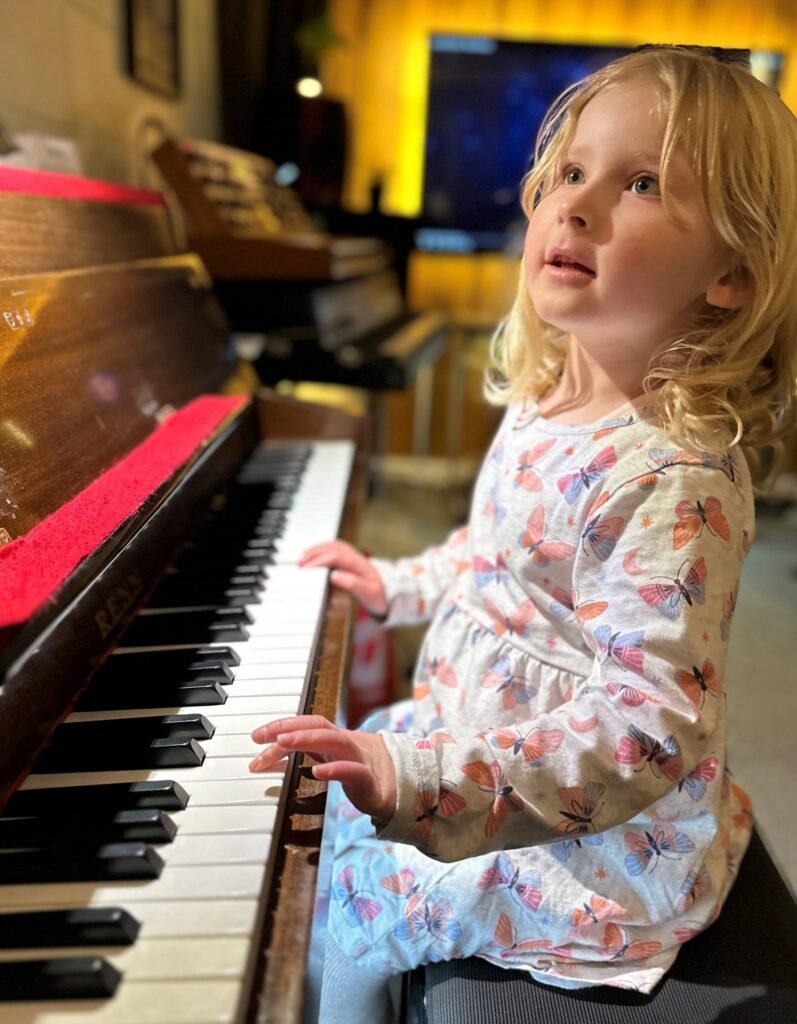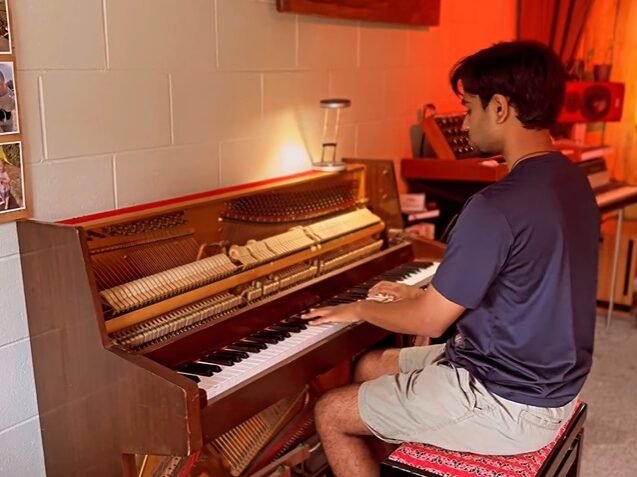To learn piano without a teacher, use online resources and structured practice routines to progress independently. Discover techniques to self-teach piano effectively while fostering a love for music.
- Introduction
- Section 2: Choosing the Best Online Resources and Tools
- Developing a Practice Routine for Independent Learning
- Why Choose Timothy William for Expertise and Guidance When You Learn Piano
- Frequently Asked Questions
- Can I learn piano on my own without any musical background?
- How long will it take to learn piano independently?
- What are the best types of pianos for beginners?
- Are online piano courses effective?
- What are the most important skills to focus on first?
- Do I need access to a piano every day?
- How can I maintain motivation when learning piano alone?
- Is it possible to learn piano without reading sheet music?
For many aspiring musicians, the journey to learn piano can seem daunting, especially when navigating it without formal teaching assistance. However, with the abundance of resources available today, it is entirely possible to embark on this musical adventure solo. From interactive online courses to instructional apps, learners have a plethora of options at their fingertips to develop their skills. In this blog, we explore how you can learn piano efficiently and effectively on your own terms.
Resources for Self-Learning
The digital era provides a bounty of opportunities for aspiring pianists. Learning piano independently can be greatly facilitated by the myriad of applications and online platforms available. Websites like YouTube offer thousands of tutorial videos ranging from beginner to advanced levels. Apps such as Simply Piano or Flowkey provide structured courses that adjust to the learner’s progress, offering a tailored learning experience. These tools can serve as excellent supplements to your practice routine, ensuring comprehensive learning at each step.
Developing a Routine
Establishing a consistent practice schedule is crucial when deciding to learn piano independently. Dedication and discipline are your best allies in this journey. Start with short, focused sessions that aim to improve specific skills such as finger placement or sight-reading. Gradually increase your practice time as your skills advance. Using a physical or digital planner can help track your progress and maintain motivation by setting achievable milestones. Remember, regular practice sustains improvement and fosters a deeper connection with your instrument.
Learning to play piano without a teacher may seem challenging, but with the right resources and a structured approach, it can become a rewarding personal project. Timothy William, a renowned piano teacher in Auckland, New Zealand, supports self-learners by offering insights into effective learning strategies and the importance of passion-driven commitment to music. In the next section, we’ll delve deeper into selecting the best online resources and tools to aid in your self-learning journey.

Section 2: Choosing the Best Online Resources and Tools
As you embark on your journey to learn piano, the wealth of available online resources can be both exciting and overwhelming. With such a variety of options, selecting the right tools and platforms can greatly influence your learning curve. From robust piano learning apps to comprehensive online courses, choosing the right resources is crucial for building knowledge, maintaining interest, and developing technique, even without a personal teacher at hand.
Piano Learning Apps
Piano learning apps have surged in popularity due to their interactive nature and convenience. Apps such as Simply Piano, Yousician, and Flowkey provide interactive feedback and a structured learning path tailored to various skill levels. These apps typically offer a mixture of video tutorials, sheet music, and assessments. Their strength lies in providing immediate feedback and gamifying the learning experience, which can be particularly motivating for beginners. Furthermore, these apps are accessible anywhere, making it easy to fit practice into your daily routine.
Online Video Tutorials
In addition to apps, online video tutorials are an invaluable resource for visual learners. Websites like YouTube host a plethora of piano tutorials spanning every genre and difficulty level imaginable. Channels focusing on piano instruction, such as PianoTV and The Piano Keys, offer free, high-quality tutorials that delve into specific songs, techniques, and theoretical concepts. These videos are especially beneficial because they allow learners to replay sections as needed and learn at their own pace. Subscription-based services, such as MasterClass, also provide comprehensive lessons from accomplished musicians, which can deepen your understanding of musical nuances and elevate your skills.
Sheet Music and Online Communities
Access to sheet music is crucial for anyone looking to learn piano, and platforms such as Musescore and IMSLP offer extensive libraries of sheet music across diverse genres. These platforms often provide additional features such as transposable scores and playback functions, which assist in reading and understanding music more effectively. Beyond resources, engaging with online piano communities can significantly enhance your learning journey. Websites such as Piano World Forums and social media groups serve as platforms for sharing advice, tips, and motivation, connecting learners globally and fostering a supportive learning environment.
Choosing resources that resonate with your learning style and schedule can solidify your foundation as you learn piano. Online tools provide flexibility and a level of autonomy that is both empowering and necessary in the quest for musical mastery. Armed with the right resources, you’ll be well on your way to achieving your piano-playing goals.

Developing a Practice Routine for Independent Learning
Embarking on the journey to learn piano on your own might seem daunting at first, but a well-structured practice routine can significantly enhance your progress and confidence. In this section, we will dive deep into creating an effective and realistic practice schedule that suits your lifestyle, keeps you motivated, and ensures steady improvement over time.
Assessing Your Current Skill Level
Before jumping into a practice routine, it’s crucial to assess your current skill level. This includes understanding your familiarity with music theory, your ability to read sheet music, and your comfort with finger placement on the keys. Beginners might start with basic exercises to build finger strength and improve dexterity, while those with some experience can incorporate scales and simple pieces. Assessing your skills will help in tailoring your routine, preventing burnout, and maintaining motivation.
Setting Realistic Goals
Once you know where you stand, it’s time to set achievable goals. Goals should be Specific, Measurable, Achievable, Relevant, and Time-bound (SMART). For instance, deciding to master a specific scale within a week, or learn a new piece every month, can give you a clear sense of direction and accomplishment. Ensuring these goals align with your enthusiasm for music will also keep your commitment high.
Building Your Schedule
The key to effective independent learning is consistency. Create a weekly schedule that includes short, daily sessions rather than long, infrequent practices. This approach helps in reinforcing muscle memory and maintaining your interest. Dedicate specific times of day to practice, ideally when you are most focused and two to three times a week for about 30 minutes to start, gradually increasing as you progress.
Incorporating Variety in Practice
Variety is vital in keeping practice engaging. Instead of repetitive exercises, incorporate different elements: a warm-up session with finger exercises, followed by scale and chord practice, and finally working on your chosen pieces. Exploring different genres and styles can also enhance your versatility and enjoyment, making practice sessions something you look forward to.
By crafting a balanced and flexible practice routine, your journey to learn piano will be both effective and enjoyable. Integrating technology from previous sections will bolster this approach, allowing you to track progress and stay motivated.
Why Choose Timothy William for Expertise and Guidance When You Learn Piano
When it comes to embarking on the journey to learn piano without a formal teacher, the right guidance and expertise can make all the difference. This is where Timothy William shines as the ideal choice in Auckland, New Zealand. Whether you are a complete beginner or someone looking to refine their existing skills, Timothy William offers a wealth of local knowledge, professional experience, and tailored support to help you progress effectively.
Experienced Local Experts
Timothy William not only understands the musical landscape of Auckland but also boasts years of experience in teaching piano. This deep-rooted understanding of the local culture and music scene enriches Timothy’s teaching approach, allowing learners to connect more deeply with the art of playing the piano. As a respected figure in the community, learners benefit from Timothy’s insights, making the learning process not only educational but also culturally enriching. His commitment to fostering a supportive learning environment ensures that every student, regardless of their starting point, can achieve their musical goals with confidence.
What Sets Us Apart
One of the key differentiators that set Timothy William apart is his personalised teaching methodology, which is adapted to each student’s individual needs and learning pace. Unlike generic online courses, Timothy engages learners with a tailored approach that emphasises skill development and practical application. His reputation for reliability and professionalism is reflected in positive testimonials from students who have successfully mastered the piano under his mentorship. Timothy’s unwavering commitment to student success primes learners for both technical proficiency and expressive performance.piano lessons in Auckland are designed to be comprehensive and supportive, incorporating innovative techniques and a wide array of musical genres to keep the learning experience dynamic and engaging. Additionally, Timothy offers resources and guidance that align with each student’s personal musical journey, promoting a lifelong passion for music.
In the next section, we will tackle some of the most frequently asked questions about how to effectively learn piano. This will provide additional clarity and confidence for those looking to enhance their skills independently.
Frequently Asked Questions
Can I learn piano on my own without any musical background?
Absolutely! Many people start learning piano without any prior music experience. The key is to begin with basic music theory and gradually build your skills. Online resources and apps can greatly assist your journey.
How long will it take to learn piano independently?
The time it takes depends on how often you practice and your personal goals. Consistent practice, even 20-30 minutes a day, can lead to noticeable progress in a few months.
What are the best types of pianos for beginners?
For beginners, a digital piano with weighted keys or an acoustic upright piano are recommended. Both options provide a good balance between quality and affordability while supporting dynamic playing techniques.
Are online piano courses effective?
Yes, online piano courses can be very effective, especially when they feature structured lessons and interactive components. Choose courses with good reviews and a curriculum that matches your learning style.
What are the most important skills to focus on first?
Start with learning to read music, basic hand positioning, and scales. These foundational skills will make future learning more manageable and rewarding.
Do I need access to a piano every day?
Regular access to a piano is beneficial, but not mandatory every day. Even practicing with a keyboard or a piano simulator app can maintain your progress and help reinforce skills.
How can I maintain motivation when learning piano alone?
Staying motivated can be challenging, so try setting achievable goals and rewarding yourself for meeting them. Joining online piano communities to share progress and tips can also be encouraging.
Is it possible to learn piano without reading sheet music?
While not essential, understanding sheet music can significantly improve your ability to play a wide range of pieces. However, many people learn through tutorials, by ear, or using simplified notation.




